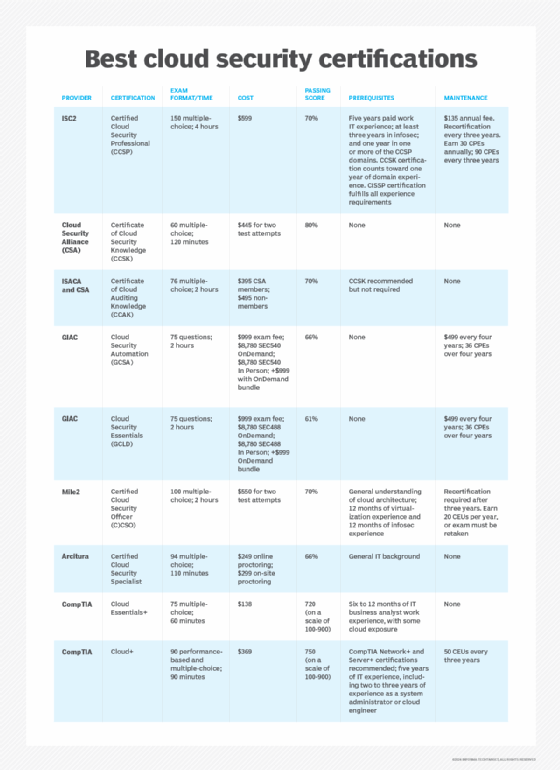The 10 best cloud security certifications for IT pros in 2025
Certifications can help security pros prove their baseline knowledge of infosec topics. Consider adding these top cloud security certifications to your arsenal.
Many professionals seeking a career in cloud security turn to certifications to advance their learning and prove their knowledge to potential employers. The number of cloud security certifications has increased in recent years, however, making it difficult for students and practitioners to decide which ones to pursue.
Are you trying to parse the differences and figure out which certifications will most advance your knowledge and career? Get the lowdown on the best cloud security certifications here.
The importance of certifications
Although the debate over the value of security certification programs is hotly contested, they are still one of the top ways employers screen job candidates and assess an interviewee's baseline knowledge. And the fact is that most certifications deliver more significant benefits to professionals than traditional self-study options.
A certification, for instance, covers broader topics than those of interest to the student, which requires learning more than just the minimum around a specific topic. Skipping a few dull but important chapters isn't a wise decision if an expensive exam is coming up.
Certification exams also force students to study the material, not just skim it. Exam dates provide a deadline to finish the material. Certificates also show employers that future employees have put significant time and money into obtaining the certificates and their associated skills.
The infosec industry has been around for decades and has some of the best-known certifications. ISC2's CISSP, for instance, was released in 1994, and ISACA's Certified Information Systems Auditor (CISA) certification dates to 1978.
These older, well-established certification providers have added cloud components to their material, but the depth of those add-ons can be limited -- sometimes, just a few pages in a book. Considering the importance of cloud technologies and the persistent threat of cloud-specific attacks, more focus is required.
Let's look at some certification providers that have introduced dedicated, in-depth cloud security certifications, as well as what cloud security pros can expect when pursuing them.
1. ISC2 Certified Cloud Security Professional (CCSP)
The most well-known and established cloud security certification is ISC2's CCSP. Although ISC2's CISSP now contains more cloud material than in years past, the nonprofit's specialized CCSP program takes it to the next level and covers a broad range of cloud-related topics, from cloud application security to cloud platform security.
Students should expect to invest quite a bit of time to pass this exam; self-led or instructor-led training should be used to prepare for this certification.
Candidates must have a minimum of five years of paid work experience in IT before becoming certified. Three years must be in infosec, and one year must be in one or more of the six domains included in the CCSP Common Body of Knowledge (CBK):
- Cloud Concepts, Architecture and Design (17% of exam).
- Cloud Data Security (20%).
- Cloud Platform & Infrastructure Security (17%).
- Cloud Application Security (17%).
- Cloud Security Operations (16%).
- Legal, Risk and Compliance (13%).
Cloud Security Alliance (CSA) Certificate of Cloud Security Knowledge can be substituted for one year of experience in one or more of the CCSP domains. Obtaining CISSP covers all prerequisites.
2. CSA Certificate of Cloud Security Knowledge (CCSK)
CSA's CCSK is a lighter alternative to CCSP certification. Launched in 2010, this certificate is dedicated to cloud security. Like CCSP, CCSK goes into technical details.
CCSK is a good alternative cloud security certification for an entry-level to midrange security professional with an interest in cloud data security.
Those studying for their CCSK can use the CSA's free Prep Kit to study and prepare for the exam. The kit includes an overview of the certificate, study and knowledge guides, a course outline, sample questions and additional resources.
CCSK v5 covers 12 domains, including Cloud Computing Concepts and Architecture, Infrastructure and Networking, Data Security and Security as a Service.
The CCSK v5 exam bundle can be purchased online. Training options include online self-paced, online instructor-led and in-person instruction.
3. ISACA and CSA Certificate of Cloud Auditing Knowledge (CCAK)
In March 2021, ISACA and CSA jointly released CCAK, which builds on and complements CCSK content. It also complements ISACA's CISA and Certified Information Security Manager certifications. Applicants are advised to achieve their CCSK prior to taking CCAK, though it is not a prerequisite.
Assessors and auditors, compliance managers, vendor and partner program managers, security and privacy consultants, security analysts and architects could benefit from the training, which covers the following domains:
- Cloud Governance.
- Cloud Compliance Program.
- CCM and CAIQ: Goals, Objectives and Structure.
- A Threat Analysis Methodology for Cloud Using CCM.
- Evaluating a Cloud Compliance Program.
- Cloud Auditing.
- CCM: Auditing Controls.
- Continuous Assurance and Compliance.
- STAR Program.
Candidates can choose online self-paced, online instructor-led and in-person training.
4. GIAC Cloud Security Automation (GCSA)
Launched in April 2020, GIAC's GCSA certification is specifically designed for developers, analysts and engineers working to secure cloud and DevOps environments. It encompasses topics such as DevOps and DevSecOps fundamentals; securing cloud architecture; data and secrets protection and compliance; and security and automation related to deployment, runtime and content delivery.
The GIAC certification is affiliated with SANS Institute's in-person or online "SEC540: Cloud Security and DevSecOps Automation" course. The SEC540 five-day course, which includes hands-on labs, covers topics in the following five sections:
- DevOps Security Automation.
- Cloud Infrastructure Security.
- Cloud Native Security Operations.
- Microservice and Serverless Security.
- Continuous Compliance and Protection.
The GIAC certification exam can be purchased by itself or at a discounted rate when bought in conjunction with the SANS training. Purchasing a certification attempt comes with practice tests, which are in the same format as the exam.
5. GIAC Cloud Security Essentials (GCLD)
Released in April 2021, GIAC's GCLD covers how to evaluate cloud service providers and how to plan, deploy and secure single and multi-cloud environments, as well as topics such as cloud auditing, security assessments and incident response.
Specialized for security engineers, analysts, managers and auditors, GCLD aims to help candidates prove their knowledge about how to prevent, detect and react to cloud workload security events.
GCLD certification is affiliated with "SEC488: Cloud Security Essentials," a six-day course with hands-on training that teaches the following:
- Identity and Access Management (IAM).
- Compute and Configuration Management.
- Data Protection.
- Networking and Detection.
- Compliance, Incident Response and Penetration Testing.
- CloudWars.
The SANS training, offered online and in person, has no prerequisites, but a basic understanding of networking, security, Linux and the cloud is beneficial.
GIAC also offers specialized certifications that could apply depending on the candidate's career path. These include the following:
- GIAC Certified Web Application Defender, affiliated with "SEC522: Application Security: Securing Web Apps, APIs and Microservices."
- GIAC Public Cloud Security, affiliated with "SEC510: Cloud Security Controls and Mitigations."
- GIAC Cloud Penetration Tester, affiliated with "SEC588: Cloud Penetration Testing."
6. Mile2 Certified Cloud Security Officer (C)CSO)
The C)CSO certification from Mile2 consists of a five-day program that includes instructor-led sessions, self-study time and live virtual trainings. It is composed of 15 modules:
- Introduction to Cloud Computing and Architecture.
- Cloud Security Risks.
- ERM and Governance.
- Legal Issues.
- Virtualization.
- Data Security.
- Data Center Operations.
- Interoperability and Portability.
- Traditional Security.
- BCM and DR.
- Incident Response.
- Application Security.
- Encryption and Key Management.
- Identity, Entitlement and Access Management.
- Auditing and Compliance.
It also consists of 23 labs, including PaaS in Azure and Encryption/Key Management in SaaS.
Part of Mile2's Cloud Security and Virtualization career path, this advanced certification is ideal for professionals seeking careers in virtualization, cloud administration, auditing and compliance.
General knowledge of cloud architectures and one year of experience in both virtualization and infosec are recommended.
7. Arcitura Certified Cloud Security Specialist
Arcitura's Certified Cloud Security Specialist certification focuses on the security threats associated with cloud platforms, cloud services and other cloud technologies, including virtualization. Geared toward IT and security professionals, as well as cloud architects, the Certified Cloud Security Specialist certification is composed of the following five modules:
- Fundamental Cloud Computing covers basic cloud technology topics such as cloud computing platforms, cost metrics and service-level agreement characteristics.
- Cloud Technology Concepts covers topics such as cloud service architecture and containerization.
- Fundamental Cloud Security contains training on cloud security mechanisms and threats, cloud auditing and cloud IAM.
- Advanced Cloud Security offers training on attack lifecycles, threat modeling and VM protection.
- Cloud Security Lab includes exercises on IAM in the cloud, public key infrastructure in the cloud, and cloud encryption and key management.
The approximately 50-hour training course culminates with the Cloud Security Specialist exam and certification. A general background in IT is recommended.

8. and 9. CompTIA Cloud Essentials+ and Cloud+
CompTIA offers two certifications that, while not security-specific, cover cloud security topics. Cloud Essentials+ is geared toward cloud business decision-making, while Cloud+ is more about technical cloud implementation.
The entry-level Cloud Essentials+ certification covers cloud security concerns and measures, as well as risk assessment, cloud security policies and compliance. Six months to one year of IT business analyst experience, along with some cloud technology experience, is recommended. The more in-depth Cloud+ certification covers security configurations, access control, key and certificate management, and segmentation and microsegmentation. Two to three years of system administration or networking experience are recommended, in addition to CompTIA Network+ and Server+ certifications.
10. Vendor-specific cloud security certifications
Because many enterprises work with specific vendors and technologies, it could be fruitful for their security team members to hold certifications in those areas. Some cloud platform providers offer practical product training, including the following:
- AWS Certified Security - Specialty.
- Google Professional Cloud Security Engineer.
- IBM Cloud Security Engineer Specialty.
- Certified Kubernetes Security Specialist.
- Microsoft Certified: Azure Security Engineer Associate.
- VMware Certified Technical Associate - Security.
- VMware Certified Professional - Endpoint and Workload Security.
Editor's note: This article was revised in December 2024 to update certification information and to improve the reader experience.
Sharon Shea is executive editor of TechTarget Security.








